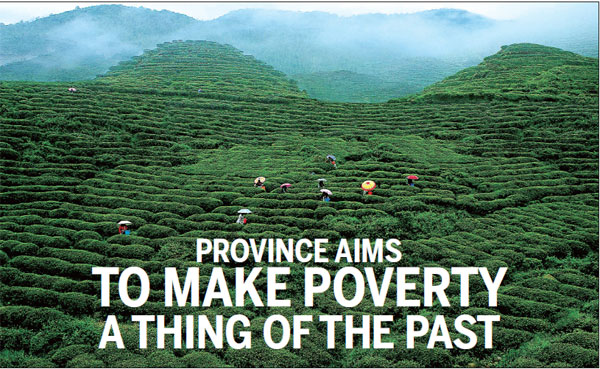Province Aims To Make Poverty A Thing Of The Past
|
Tea plantations in Jinggangshan have played an important role in alleviating poverty among farmers.Provided To China Daily |
Jiangxi's ambitious plans include mass investment and the relocation of impoverished residents, Zhao Shijun reports.
The government of Jiangxi should use "greater determination and more accurate measures" to solve problems relating to poverty relief, according to a top provincial official.
Liu Qi, governor of the East China province, said poverty relief will be top on the government's agenda during the 13th Five-Year Plan period (2016-20).
He anticipated that, by 2018, around 2 million people can be lifted out of poverty and as many as 2,900 villages can shed their "poverty village" tag.
According to the State Council Office for Poverty Alleviation and Development, a per capital annual net income of 2,800 yuan ($417) represented the official poverty line for rural residents last year. The standard is subject to annual adjustment.
Almost 2 million Jiangxi residents were living under the poverty line last year, with the majority living in rural areas, according to the Jiangxi Provincial Office for Poverty Alleviation.
The governor said Jiangxi's poverty alleviation measures should be dictated by market rules, with the province encouraging residents, especially farmers, to increase their incomes by establishing cooperatives and cottage industries producing specialty goods.
He added that the province's financial institutions should give greater support to poverty alleviation measures by offering insurance services and lower-interest loans to help farmers start their own businesses.
Liu said there will be increased local government investment to improve the rural infrastructure, offering farmers better access to roads, electricity and telecommunications, as well as a better living environment.
"We should help people to relocate from areas with poor infrastructure and living conditions to relatively developed areas," Liu said, adding that this year's relocation effort will benefit as many as 96,000 people.
He said a medical care system supported by the government and complemented by commercial insurers would ensure that more of the province's poorer residents are covered.
"To be certain that our poverty relief efforts are properly targeted and benefit the people who most need them, we will establish a multilevel, province-wide database," said the governor. He added that the database will be operational by November.
Zhang Kanghua, head of the Jiangxi Provincial Office for Poverty Alleviation, said the province has made great strides in the fight against poverty in recent years.
He said the number of impoverished people in the province fell by 1.42 million, or 41 percent, between 2013 and 2015.
Zhang noted that Jiangxi expects to make even greater progress in the next two years.
He cited a provincial government research report which stated that all of Jiangxi's impoverished residents should be lifted above the poverty line by the end of 2018.
He said that meeting the goal would depend largely on the successful relocation of the province's impoverished population.
According to Zhang, about 385,000 people will be relocated to relatively developed areas in the province during the 13th Five-Year Plan.
The relocation program for this year will involve more than 700 projects focused on house building and the construction of public facilities. requiring investment of around 7.2 billion yuan. The per capita floor space required to relocate the province's impoverished residents is 25 square meters.
Zhang also said industrial development and employment services will be included in the relocation initiative.
Pan Changkun, deputy chief of the provincial financial department, said the government will allocate 20 billion yuan for poverty alleviation measures and projects between 2016 and 2018.
He also encouraged more social investments to be used in poverty alleviation.
"Both State-owned and privately run businesses can invest in agricultural production, processing and distribution, which will help increase farmers' incomes," Pan explained.
Contact the writer at [email protected]

























